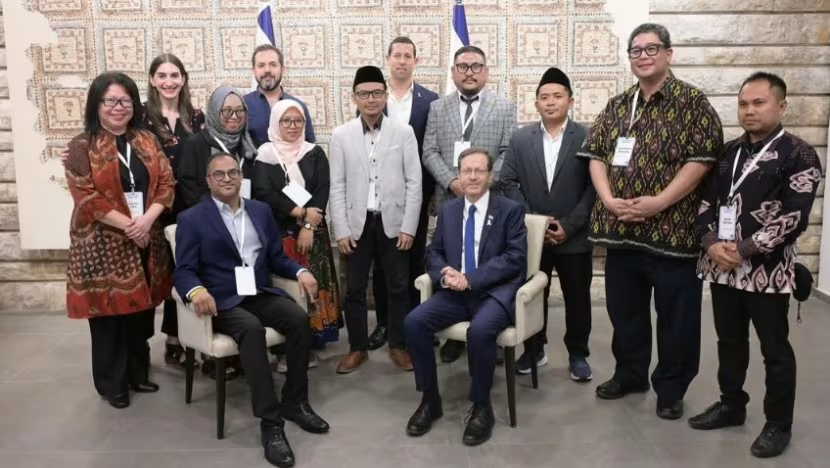Australia/Israel Review
Asia Watch: “Inappropriate” relations
Aug 14, 2024 | Michael Shannon

Periodic speculation that Indonesia may someday upgrade political relations with Israel usually runs into a perennial obstacle. Whatever the political configuration in Jakarta, identification with the Palestinian cause and reservations about the Jewish state are deeply ingrained in some prominent sectors, thereby limiting prospects for improving relations except in more favourable conditions.
Further confirmation that the outbreak of war in Gaza last October has put on hold such hopes came with the backlash over a viral photo showing five youth cadres of Indonesia’s largest Muslim organisation meeting with Israeli President Isaac Herzog in Jerusalem.
News of the meeting came to light after Zainul Maarif, a scholar and member of Nahdlatul Ulama (NU), shared an Instagram post on July 7 with a photo of the visit, stating that the meeting provided an opportunity to discuss the ongoing “conflict between Hamas and Israel” and Indonesia-Israel relations.
“I am not a protester, I am a religious philosopher. Instead of protesting on the streets and conducting boycotts, I much prefer discussions and conveying ideas,” he wrote.
The meeting was reportedly arranged by an alumni group of Harvard University, who invited the NU members to Israel for discussions on “academia and start-ups”.
Among those weighing in was the Indonesian Ulema Council (MUI), a body of the country’s top Islamic scholars, which said it “deeply (regretted)” the visit at a time when tens of thousands of Palestinians have been killed [in the conflict], while the Indonesian Government swiftly distanced itself from the controversy, saying the visit was “not related in any way to the formal stance of the Indonesian government.”
The five also faced a stern backlash from NU’s national board of executives, who fired them from their relatively low-level positions, arguing that they had neither notified nor sought permission prior to the visit. “It is inappropriate for NU members to visit Israel. It is an act of geopolitical ignorance,” said an NU spokesperson.
Describing the visit as “inappropriate” and “tone-deaf”, NU chairman Yahya Cholil Staquf said in a press conference at NU’s headquarters in Jakarta, “We understand that this is something that crossed the line in the context of the current situation [between Israel and Palestine].”
Yahya further stated that NU cadres cannot establish relations with Israel-related parties, even if the purpose is to develop activities or scholarship programs. “The only thing allowed is to help the Palestinian people. That is the only thing that is allowed and this must be stated explicitly to all parties who engage,” he said.
Notably, Yahya himself visited the country in 2018 when he was NU’s secretary-general, having accepted an invitation by the American Jewish Committee to speak at a seminar. He and his NU entourage met then-Israeli PM Netanyahu. Faced with criticism, he justified his visit as promoting peace between Palestine and Israel.
Famously, the late former president Abdurrahman Wahid, then NU chairman, visited Israel several times for interfaith dialogues throughout the 1990s and called for upgraded relations with Israel, which prompted a backlash from some Muslim groups at home.
Those initiatives had put NU under scrutiny, even if they occurred at a time of relative calm, but in the context of the Gaza conflict, the visit has strengthened the conviction of NU’s critics that it is a friend of Israel.
Meanwhile, the growing trade volume between Indonesia and Israel – most of which takes place via third countries – made national headlines in July, prompting calls upon the Indonesian Government to act.
Data from the country’s Central Statistics Agency showed Israeli exports to Indonesia amounting to more than US$35 million (A$53m) between January and May 2024. While the amount is a minuscule proportion of Indonesia’s overall imports (less than 0.05%), it is nearly four times higher than the $8.85 million (A$33.3m) recorded in the same period in 2023 and surpassed last year’s total of $21.9 million. The official data also showed exports to Israel from Indonesia had by May reached more than $66 million (A$100m).
The Indonesian Ulema Council (MUI) called on the Government to protect consumers from products linked to Israel, saying that trade links “must be stopped”.
The MUI’s chair of foreign relations, Dr Sudarnoto Abdul Hakim, told Arab News that the Government must protect Indonesian consumers under the existing consumer protection laws.
“Any trade will surely yield profits… This financial gain is what could potentially play an important role in funding Israel’s main programs right now,” Hakim said. “Since Israel’s current main agenda is to finish Palestine, let’s not support that.”






